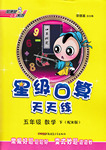题目内容
假设你是李华,你的加拿大笔友Daniel来信向你求助。他最近和妈妈闹矛盾,因为妈妈不让他过多上网。他对此很不理解。请你给他写一封回信,要点如下:
(1)建议他向妈妈道歉;(2)说明过多上网的危害;(3)列举一些健康的休闲方式。
注意:(1)词数80左右;
(2)可适当加入细节,以使行文连贯;
(3)开头和结尾已给出,不计入总词数。
Dear Daniel,
I’m very sorry to hear that a conflict occurred between you and your mother because of your Internet addiction.
____________________________________________________________________________________________
____________________________________________________________________________________________
____________________________________________________________________________________________
____________________________________________________________________________________________
____________________________________________________________________________________________
____________________________________________________________________________________________
____________________________________________________________________
Yours,
Li Hua
 星级口算天天练系列答案
星级口算天天练系列答案

